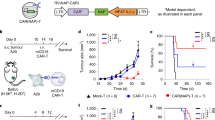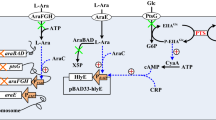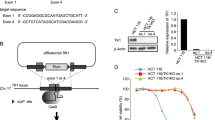Abstract
Uracil phosphoribosyltransferase (UPRT) of Escherichia coli origin can convert 5-fluorouracil (5-FU), a chemotherapeutic agent widely used for solid tumors, to an active intermediate, 5-fluorouridine-5′-monophosphate, as mammalian orotate phosphoribosyltransferase does. To examine whether the E. coli UPRT gene expressed in tumor cells can confer increased sensitivity to 5-FU, we retrovirally transduced Colon 26 cells, a murine colon carcinoma cell line, with the UPRT gene (Colon 26/UPRT cells) and tested the in vivo antitumoral effect of 5-FU in syngeneic immunocompetent mice. After 5-FU administration, tumors of Colon 26/UPRT cells regressed, whereas those of wild-type cells were unaffected. The mice that once eliminated Colon 26/UPRT tumors after 5-FU treatment rejected wild-type cells that were subsequently inoculated but not irrelevant syngeneic tumor cells. This suicide gene/prodrug system was less efficient in nude mice, suggesting that mature αβ T cells play a role in the antitumoral effect. The cytotoxicity mediated by the bystander effect was marginal in this system, contrary to the herpes simplex virus-thymidine kinase gene/ganciclovir system. Therefore, expression of the UPRT gene in tumor cells followed by 5-FU administration is a possible strategy for cancer gene therapy, but potentiation of the bystander effect is required for its therapeutic application.
This is a preview of subscription content, access via your institution
Access options
Subscribe to this journal
Receive 12 print issues and online access
$259.00 per year
only $21.58 per issue
Buy this article
- Purchase on Springer Link
- Instant access to full article PDF
Prices may be subject to local taxes which are calculated during checkout
Similar content being viewed by others
Author information
Authors and Affiliations
Corresponding author
Rights and permissions
About this article
Cite this article
Kawamura, K., Tasaki, K., Hamada, H. et al. Expression of Escherichia coli uracil phosphoribosyltransferase gene in murine colon carcinoma cells augments the antitumoral effect of 5-fluorouracil and induces protective immunity. Cancer Gene Ther 7, 637–643 (2000). https://doi.org/10.1038/sj.cgt.7700154
Received:
Accepted:
Published:
Issue Date:
DOI: https://doi.org/10.1038/sj.cgt.7700154
Keywords
This article is cited by
-
Double suicide gene therapy using human neural stem cells against glioblastoma: double safety measures
Journal of Neuro-Oncology (2014)
-
Interaction studies of E. coli uracil phosphoribosyltransferase with 5-fluorouracil for potent anti cancer activity
Medicinal Chemistry Research (2012)
-
Implication of functional activity for determining therapeutic efficacy of suicide genes in vitro
Biotechnology Letters (2008)
-
Combination of cytosine deaminase suicide gene expression with DR5 antibody treatment increases cancer cell cytotoxicity
Cancer Gene Therapy (2006)
-
Combined suicide gene therapy for pancreatic peritoneal carcinomatosis using BGTC liposomes
Cancer Gene Therapy (2004)



